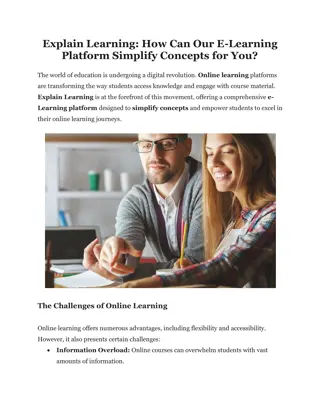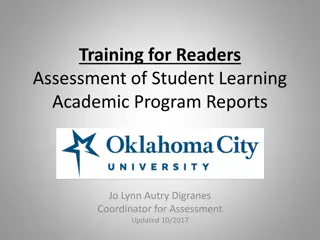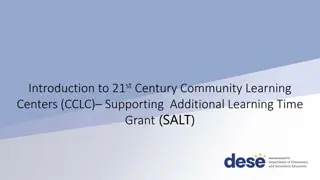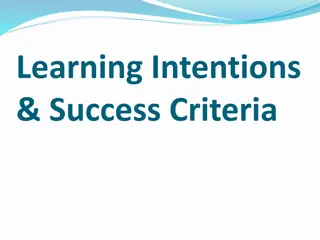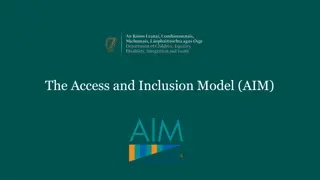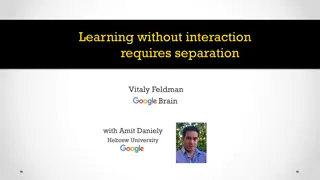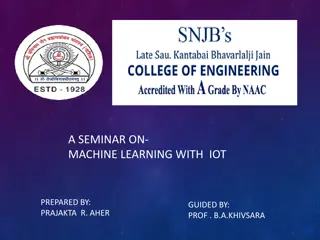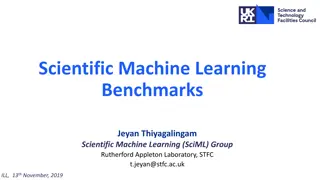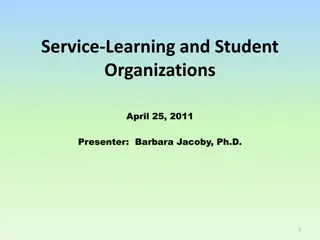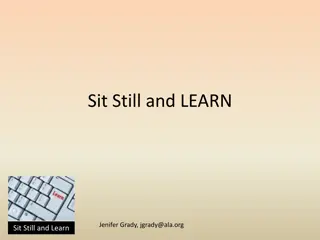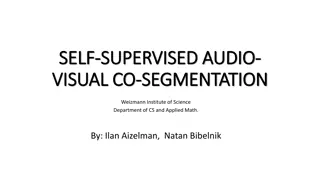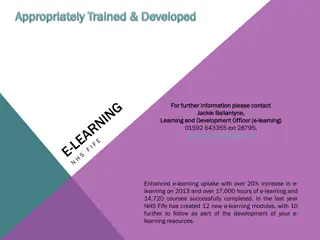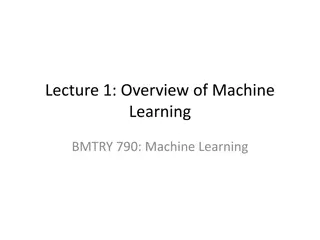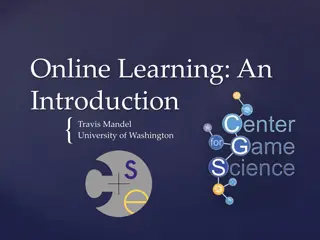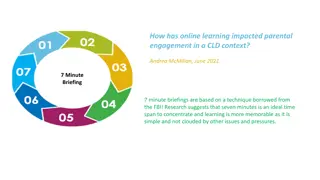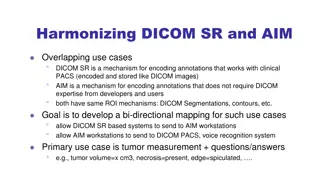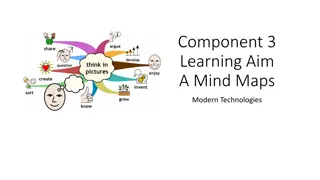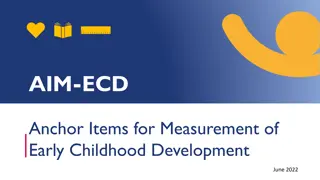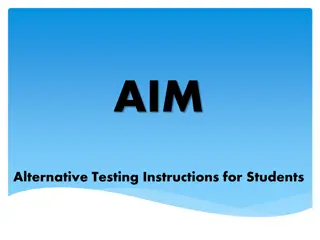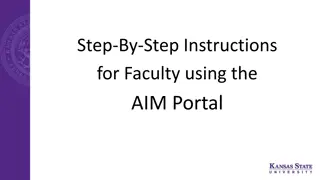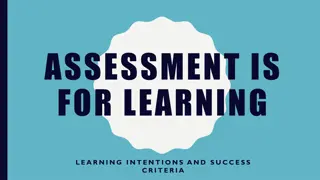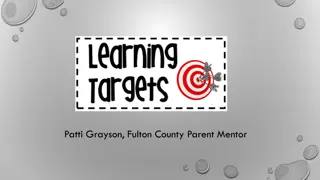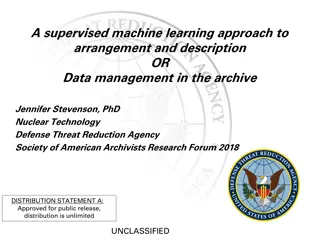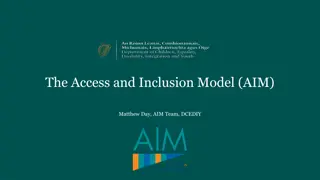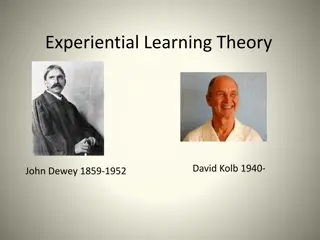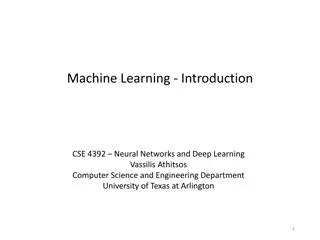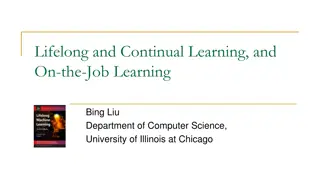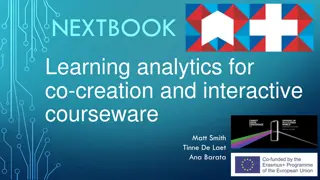Effective Use of RE-AIM in Implementation Research
Explore the origins, elements, and case uses of the RE-AIM framework. Learn how to address common misconceptions, its evolution, and related resources. Follow Dr. Marcia G. Ory's professional journey and the mission of the Center for Community Health and Aging. Discover the RE-AIM origin story, hypo
1 views • 49 slides
Community Language Learning
Community Language Learning (CLL) involves collaborative language learning where teachers act as counselors and learners work together. CLL teachers aim to teach communicative language skills, foster self-learning, and mutual learning among students through valuing thoughts and feelings. Popular
2 views • 14 slides
Explain Learning How Can Our E-Learning Platform Simplify Concepts for You
Explain Learning is at the forefront of this movement, offering a comprehensive e-learning platform designed to simplify concepts and empower students to excel in their online learning journeys. Know more \/\/explainlearning.com\/blog\/explain-learning-e-learning-platform-simplifies-concepts\/
1 views • 4 slides
Understanding Reader Assessment for Student Learning Improvement
This presentation outlines the importance of assessment in student learning, covering topics such as the reader review process, student learning outcomes, evidence analysis, and stakeholder engagement. It emphasizes the systematic collection of information to inform decisions for enhancing learning
1 views • 28 slides
Enhancing Learning Opportunities through 21st Century Community Learning Centers (CCLC) Grant
The 21st Century Community Learning Centers (CCLC) grant program, part of the Every Student Succeeds Act, supports additional learning time for students through enriching programs. These programs aim to increase engagement, provide a well-rounded education, and empower diverse student populations. G
0 views • 24 slides
Understanding Learning Intentions and Success Criteria
Learning intentions and success criteria play a crucial role in enhancing student focus, motivation, and responsibility for their learning. Research indicates that students benefit greatly from having clear learning objectives and criteria for success. Effective learning intentions should identify w
1 views • 24 slides
The Access and Inclusion Model (AIM) - Supporting Inclusive Early Learning
The Access and Inclusion Model (AIM) provides supports for children and staff in Early Learning and Care settings to create a more inclusive environment regardless of ability. Founded in 2016 by the DCEDIY, AIM offers Universal and Targeted supports to empower preschool providers and focus on the ne
3 views • 13 slides
Enhancing Education in Uganda: A World Bank Initiative
The World Bank's portfolio in Uganda focuses on addressing challenges in the education sector such as high dropout rates, declining learning outcomes, and limited access to education, especially for women and girls. The response includes initiatives to improve service delivery, strengthen equity, an
1 views • 18 slides
Online Seminar: Theories of Learning in Initial Teacher Education
This collection of online seminar slides introduces pre-service teachers to major theories of learning, including the Science of Learning through cognitive neuroscience. The presentation aims to help educators consider implications for teaching, recognize theories in action, and pose critical questi
1 views • 11 slides
Experiential Learning Portfolio Program at Barry University
Experiential Learning Portfolio Program at Barry University's School of Professional and Career Education (PACE) offers a unique opportunity to earn college credit for learning gained from work and community service experiences. Through this program, students can showcase their experiential learning
0 views • 16 slides
Exploration of Learning and Privacy Concepts in Machine Learning
A comprehensive discussion on various topics such as Local Differential Privacy (LDP), Statistical Query Model, PAC learning, Margin Complexity, and Known Results in the context of machine learning. It covers concepts like separation, non-interactive learning, error bounds, and the efficiency of lea
0 views • 14 slides
Seminar on Machine Learning with IoT Explained
Explore the intersection of Machine Learning and Internet of Things (IoT) in this informative seminar. Discover the principles, advantages, and applications of Machine Learning algorithms in the context of IoT technology. Learn about the evolution of Machine Learning, the concept of Internet of Thin
0 views • 21 slides
Innovative Learning Management System - LAMS at Belgrade Metropolitan University
Belgrade Metropolitan University (BMU) utilizes the Learning Activity Management System (LAMS) to enhance the learning process by integrating learning objects with various activities. This system allows for complex learning processes, mixing learning objects with LAMS activities effectively. The pro
4 views • 16 slides
Scientific Machine Learning Benchmarks: Evaluating ML Ecosystems
The Scientific Machine Learning Benchmarks aim to assess machine learning solutions for scientific challenges across various domains like particle physics, material sciences, and life sciences. The process involves comparing products based on large experimental datasets, including baselines and mach
1 views • 35 slides
Exploring Service-Learning and Student Success in Higher Education
This presentation by Dr. Barbara Jacoby delves into the intersection of service-learning and student organizations, emphasizing the public purpose of higher education, student engagement in learning, and the importance of learning outcomes and assessment. It covers fundamental principles, designing
2 views • 23 slides
Unlocking the Power of Online Learning with Jenifer Grady
Explore the transformative nature of learning through online platforms with insights from Jenifer Grady. Understand the essence of learning, reasons behind learning, accessibility, and the concept of online learning. Discover how learning can be achieved anywhere, anytime, and delve into the world o
0 views • 26 slides
Enhancing Learning Through Active Strategies and Learning Styles
Implement active learning strategies to engage students, deliver and review content, and foster collaboration. Explore Kolb's Learning Styles to accommodate diverse learner preferences and maximize learning outcomes. Integrating learning activities based on individual styles can create a more effect
0 views • 22 slides
Exploring Self-Supervised Audio-Visual Learning for Segmentation Tasks
Researchers from the Weizmann Institute of Science delve into the realm of self-supervised audio-visual learning for segmentation tasks, leveraging the correlation between visual and audio events to jointly train networks for enhanced understanding. Motivated by the potential of unsupervised learnin
0 views • 44 slides
NHS Fife E-Learning Success and Development Overview
NHS Fife has significantly enhanced its e-learning provision under the leadership of Jackie Ballantyne, with a notable increase in uptake and successful completion of courses. The development of over 80 e-learning programs has resulted in cost savings and improved accessibility to learning opportuni
0 views • 8 slides
Blended Learning Initiatives in Education: RYHT Presentation Overview
Blended learning, as defined in the State Board of Education presentation on November 17, 2015, is gaining traction in K-12 education for achieving student-centered learning at scale. The presentation highlights the potential benefits of blended learning in enhancing student achievement through pers
0 views • 10 slides
Enhancing English Language Support for Online Distance Learning Students at University of Edinburgh
University of Edinburgh's English Language Teaching Centre developed an Online Academic Presessional Language course (OPAL) to support Online Distance Learning (ODL) students. The course focused on academic writing to enhance written accuracy and appropriacy, using existing ELTC materials. Research,
0 views • 27 slides
Year Four Information for Parents
The Year Four team is excited to welcome your children to their new learning environment. Transition activities include meeting the new teachers, learning about Year 4 highlights, and setting goals for a successful year. Parents are encouraged to support their child's learning at home, especially in
0 views • 14 slides
Introduction to Machine Learning in BMTRY790 Course
The BMTRY790 course on Machine Learning covers a wide range of topics including supervised, unsupervised, and reinforcement learning. The course includes homework assignments, exams, and a real-world project to apply learned methods in developing prediction models. Machine learning involves making c
0 views • 62 slides
Computational Learning Theory: An Overview
Computational Learning Theory explores inductive learning algorithms that generate hypotheses from training sets, emphasizing the uncertainty of generalization. The theory introduces probabilities to measure correctness and certainty, addressing challenges in learning hidden concepts. Through exampl
0 views • 43 slides
Exploring Open Learning Initiatives in Education
This collection showcases various open learning initiatives in education, dating back to 1996 and spanning through recent years. From the concept of Massive Open Online Support for Education to the implementation of programs like One Laptop Per Child and Early Literacy Workstations, these endeavors
0 views • 28 slides
Understanding Online Learning in Machine Learning
Explore the world of online learning in machine learning through topics like supervised learning, unsupervised learning, and more. Dive into concepts such as active learning, reinforcement learning, and the challenges of changing data distributions over time.
0 views • 49 slides
Impact of Online Learning on Parental Engagement in CLD Context
The global pandemic in 2020 led to the closure of schools, shifting learning to online platforms. This study explores how online learning has affected parental engagement in Culturally and Linguistically Diverse (CLD) contexts. Family Learning, distinct from homeschooling, plays a crucial role in en
0 views • 11 slides
Harmonizing DICOM SR and AIM for Enhanced Clinical Annotation Workflow
Mechanisms like DICOM SR and AIM offer ways to encode annotations in medical imaging, each with unique benefits. The goal is to establish bi-directional mapping for interoperability between DICOM SR-based systems and AIM workstations, particularly for tasks like tumor measurements and clinical repor
0 views • 15 slides
Key Insights on Modern Technologies in Learning Aim Mind Maps
Explore key terms and concepts related to modern technologies in learning aim mind maps, covering aspects such as traditional networks, cloud storage, online applications, synchronization, disaster recovery policies, collaborative technologies, and more. Discover the significance of inclusivity and
0 views • 8 slides
Understanding AIM-ECD: An Innovative Tool for Early Childhood Development Measurement
AIM-ECD is a comprehensive tool designed for measuring early childhood development, consisting of Child Direct Assessment (DA) and Caregiver Report (CR). It covers key domains like Early Literacy, Early Numeracy, Executive Functioning, and Social-Emotional skills. Implemented in various countries, A
0 views • 11 slides
Alternative Testing Instructions for Students using AIM System
Students using the Accessible Information Management (AIM) online system for scheduling quizzes and exams are guided on how to request accommodations, communicate with instructors, schedule exams, and manage exam requests. Instructions include accessing AIM, submitting exam forms, scheduling exams,
0 views • 7 slides
Step-By-Step Instructions for Faculty Using the AIM Portal
General overview of the process for faculty members using the Accessible Information Management (AIM) portal at their Student Access Center (SAC). Key points include applying and registering with SAC, requesting letters of accommodation, scheduling exams, completing Alternative Testing Agreements, a
0 views • 13 slides
Maximizing Student Learning Through Effective Assessment Strategies
Explore the importance of assessment for learning, learning intentions, and success criteria in educational settings. Discover how to create and implement effective learning intentions, success criteria, formative assessment, and feedback practices to drive student progress and achievement. Dive int
0 views • 49 slides
Importance of Learning Targets in Educational Settings
Learning targets play a crucial role in guiding educational sessions by outlining what learners are expected to achieve and how they will demonstrate their learning. They help keep everyone focused, aid in data collection for target groups, and act like GPS directions for learning goals. Learning ta
0 views • 18 slides
Supervised Machine Learning for Data Management in Archives
In this study by Jennifer Stevenson, a supervised machine learning approach is proposed for arrangement and description in archives, specifically focusing on the DTRIAC collection which contains a vast amount of historical documents related to nuclear technology. The aim is to expedite the catalogin
1 views • 15 slides
The Access and Inclusion Model (AIM) - Supporting Inclusion in Early Learning and Care Settings
The Access and Inclusion Model (AIM) provides a suite of supports for children and staff in Early Learning and Care settings, founded by the Department of Children, Equality, Disability, Integration and Youth (DCEDIY) in 2016. AIM aims to create a more inclusive environment so that all children, reg
0 views • 12 slides
Understanding Experiential Learning Theory and its Applications
Experiential Learning Theory, developed by David Kolb and influenced by John Dewey, emphasizes the role of experience in learning. It consists of four modes - Concrete Experience, Reflective Observation, Abstract Conceptualization, and Active Experimentation - forming a continuous learning cycle. Th
1 views • 10 slides
Understanding Machine Learning: Types and Examples
Machine learning, as defined by Tom M. Mitchell, involves computers learning and improving from experience with respect to specific tasks and performance measures. There are various types of machine learning, including supervised learning, unsupervised learning, and reinforcement learning. Supervise
0 views • 40 slides
Lifelong and Continual Learning in Machine Learning
Classic machine learning has limitations such as isolated single-task learning and closed-world assumptions. Lifelong machine learning aims to overcome these limitations by enabling models to continuously learn and adapt to new data. This is crucial for dynamic environments like chatbots and self-dr
0 views • 32 slides
Enhancing Learning Through Co-Created Interactive Courseware and Learning Analytics
Explore the innovative concept of co-creation in interactive courseware and learning analytics to improve student learning outcomes. Discover how students collaborate in a social learning environment, track their progress, and engage in dialogic and constructive pedagogical strategies. Harness the p
0 views • 19 slides


